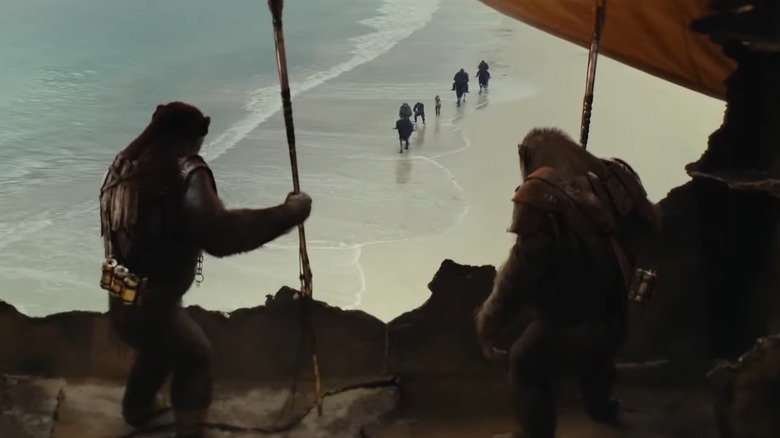Your cart is currently empty!
Kingdom of the Planet of the Apes definitely ranks as the worst in the Apes franchise. It looks good, but it lacks what made the franchise successful over the decades. While I would argue that another Apes film could do well, even leading to the point where we could have a full remake of the original Charlton Heston film, Kingdom goes the wrong direction.
The problem, as I mentioned in my previous review, is that the story is completely human-centric. All the secondary characters seem to be more interested in what humanity was than their own lives. The only ones who seem to care about apes are Noa and his tribe, who you see for less than 15 minutes of this 2 hour 25 minute film.
All other issues aside, the writers’ lack of interest in developing ape civilization is what makes it a missed opportunity. To understand what I mean, we need to go back to the book and the movie adaptations of the sixties and seventies.
The original book by the French author Pierre Boulle told a tale of a planet ruled by apes, where humans were speechless and animalistic. We see the ape civilization of the book as commentary on humanity. Humans once ruled the planet but became complacent, which allowed the apes to take over. In the end, civilization belonged to the apes.
In the first Planet of the Apes film, Charlton Heston’s character, George Taylor, was that same aberration. The apes weren’t exactly at the peak of civilization, but they were the dominant species. Its not-so-veiled commentary on humanity was still in full force, and we got to see what that civilization looked like, through Taylor’s eyes.
In Beneath the Planet of the Apes, there was a twisted and mutated form of human civilization, but they eventually fell to the apes. Yes, Taylor blew up the planet, but only because the apes had won the day. (Watch the Behind the Planet of the Apes documentary to understand why that dark turn was taken, it’s fascinating…but I digress.)
All the movies since have had one theme. They all end with a feeling that a planet of the apes is inevitable.
Escape from the Planet of the Apes ended with a speaking ape. Conquest of the Planet of the Apes ended with apes rising up against their human masters. Battle for the Planet of the Apes had one final battle between apes and humans, with the humans losing.
The trilogy of the last decade: Rise, Dawn, and War followed that same pattern and ended with the same feeling. Apes ascending to dominance seems inescapable, the fall of humanity equally so. Even Tim Burton’s film, which ended most like Pierre Boulle’s novel, gives this impression…in a way.
With this feeling in mind, this surety that a planet of the apes is the future and humanity is in the past, you can imagine that I was disappointed by the fact that this movie wasn’t about a planet of apes. Without being present, humans became the center of the story. Questions about who they were, stories about what they could do, the power their ancient toys could provide, all prevailed over what could have been a story of ape development and culture.
Having a single intelligent human in the film, someone with whom we could learn about the new ape kingdom, would have really lent the film credence. It was even set up in the Caesar trilogy, with news stories in the background regarding a lost space mission. If the writers had followed up, that would have been compelling. As is obvious by now, that’s not what we got… more’s the pity.
WARNING: SPOILERS AHEAD
This movie ended with a final rub that is most unforgivable, considering the setting. Intelligent human life ended three hundred years before the event of this film. There should be no humans left who can speak, yet we have one: the girl called Mae.
Where did she come from, how can she speak? We’re left with this question for the entire movie. Turns out, Mae comes from a bunker of other intelligent humans, using technology that shouldn’t be functioning 300 years after the plague that destroyed humanity.
The movie ends with them connecting to a satellite that is somehow still in orbit and then making contact with another human outpost that somehow still exists. We’re shown this like we’re shown the scene from the original Charlton Heston film of the Statue of Liberty on the beach.
The reaction to that was, “OMG!” The reaction to this is, “WTF!”
The fact that there are still bastions of humans who have working technology, still struggling against the inevitable, completely goes against the feeling at the core of Planet of the Apes. Why humanity failed is the point of the movies. Having them still around completely undoes the work of the previous films. And what? Are we looking at a new rise of humans? I certainly hope not.
Hey Disney, let this one go…it’s over, you’ve killed it, move on.


Leave a Reply